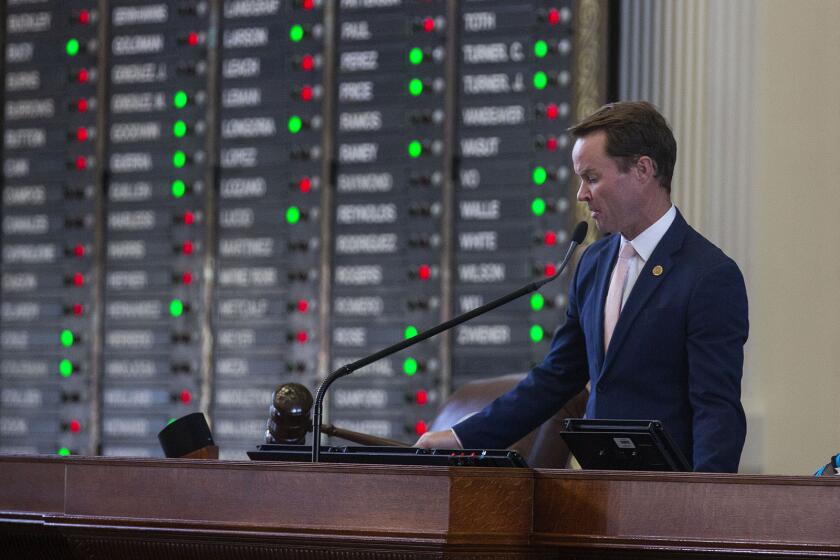Republicans’ belief in Trump’s ‘Big Lie’ holds steady as confidence in U.S. elections dips

- Share via
WASHINGTON — Just over a quarter of Republicans accept President Biden as the winner of the 2020 election, according to a new survey that underscores the instability of American democracy and the growing partisan divide over the legitimacy of elections.
“There was a hope there would see growing acceptance of Biden’s victory over time, as people moved away from the ‘Stop the Steal’ movement after Jan. 6. Instead, we saw the numbers stay in place,” said Brendan Nyhan, a Dartmouth political scientist and one of the founders of Bright Line Watch, an organization that monitors the health of U.S. democracy.
Sinking confidence in election outcomes appears to have been fueled by former President Trump’s “Big Lie” — his continued claims of voter fraud in key states, even though such allegations were repeatedly discredited in numerous lawsuits and audits. The fallout of such lies was especially evident on Jan. 6, when thousands of Trump supporters violently stormed the U.S. Capitol in a brazen attempt to halt lawmakers’ certification of Biden’s victory.
Since then, many Republican officeholders and some of the biggest voices in conservative media have clung to the notion that the election was stolen from Trump.
Bright Line Watch’s November survey, released Thursday morning, shows that only 27% of Republicans accept Biden as the rightful winner — the exact same figure as in the group’s February poll — compared with 94% of Democrats who do.
The survey also shows that the 2020 election and its aftermath have hardened partisan attitudes about future elections, leaving Republicans less confident that their votes will be counted accurately in 2022.
Even amid Trump’s constant rhetoric during the 2020 campaign about a potentially rigged outcome, Democrats and Republicans had roughly equal confidence in October 2020 that the coming election would be decided fairly, with 59% of Democrats and 58% of Republicans believing that would be the case.
But the new survey reveals that a partisan gap has opened up in response to that question. Now, 80% of Democrats believe next year’s midterm election will be fair, with just 42% of Republicans saying the same.
“That’s a really scary fact for our democracy right now, that so many Republican voters don’t have confidence in the election,” said Susan Stokes, another founder of Bright Line Watch and a political scientist at the University of Chicago.
President Biden convenes leaders from over 100 countries to fortify democratic ideals and ambitions, even amid anti-democratic movements in the U.S.
As Trump and so many Republicans have sowed mistrust in last year’s election results, they have used their misinformation campaign to justify new laws in several GOP-controlled states to restrict ballot access and, in some cases, allow partisan lawmakers to overrule election officials in determining outcomes.
That could lead to a scenario in which Democratic voters, even those who understand their party is facing stiff political headwinds next year, lose confidence in the legitimacy of the 2022 electoral results.
“This is an asymmetric moment. Republicans are leading the assault on our democracy,” Nyhan said. “At same time, you can imagine a world where an election is decided because of genuinely dubious election administration practices, and Democrats would become quite distrustful of such an election in the aftermath, and rightfully so.
“You can see a situation where neither side trusts the election results,” he continued. “The potential for a spiral of illegitimacy is real, and that’s not sustainable for our democracy in the long term.”
At the federal level, Democrats have been unable to agree on a legislative response that would protect voting rights, largely because they have the most slender of Senate majorities. Two centrists in the caucus, Sens. Joe Manchin III (D-W.Va.) and Kyrsten Sinema (D-Ariz.), oppose changing Senate rules to enable Democrats to pass a voting rights law with just 50 votes. And they continue to call for a bipartisan agreement even though few Republicans have been willing to compromise in what has become a zero-sum policy battleground.
The Texas Legislature has signed off on a sweeping GOP rewrite of election laws after months of protests by Democrats.
The November survey, which questioned 2,750 individuals, also found that partisans tend to overestimate the antidemocratic leanings of the other side, like a reflection of the increasingly partisan nature of cable news and the proliferation of incendiary politically oriented posts and memes across social media platforms.
Compared to past Bright Line Watch surveys, fewer respondents expressed support for political violence. Only 9% condoned making threats, 8% were OK with verbal harassment, and just 4% said they accepted the kind of mob violence that occurred on Jan. 6.
But researchers worry those numbers may not reflect how many partisans might be led to take or support extreme actions that they claim to oppose, with the justification that they need to overcome alleged extremism by the opposing side.
“It’s still millions of Americans condoning violence, and that makes for a very explosive environment and is quite dangerous,” Stokes said. “What people are saying to themselves is: ‘Whatever my side is doing, it’s worth it, because the other side is so terrible.’
“It’s not at all hard to imagine a lot of people in the public going along with a real stealing of the election next time because they have come to believe the other side stole it — or even if they don’t, it’s so important to keep the other side out, it doesn’t matter how you do it.”
More to Read
Get the L.A. Times Politics newsletter
Deeply reported insights into legislation, politics and policy from Sacramento, Washington and beyond. In your inbox twice per week.
You may occasionally receive promotional content from the Los Angeles Times.













